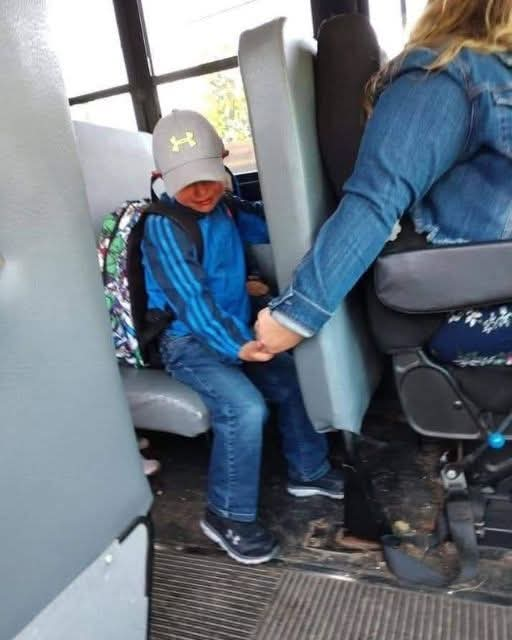He used to be my little ray of sunshine.
Every morning, Calvin would burst through the front door like he’d been launched from a cannon—calling out goodbye to the dog, waving his plastic dinosaur at me, then rushing down the driveway to catch the bus. He was six but full of so much energy that I’d forget my morning coffee. And that smile of his could brighten up the whole neighborhood.
But then, something shifted.
It started slowly. Fewer smiles. Quiet “good mornings.” Then came the mornings when he didn’t want to put on his shoes, the days he complained about stomachaches but couldn’t explain why, the sleepless nights when he begged to keep the hallway light on. And worst of all—he stopped drawing.
Calvin loved to draw. He once filled the guest room walls with sketches of a zoo using washable markers. Now, his drawings were empty or filled with dark, angry scribbles. Torn and crumpled.
I didn’t want to panic. Maybe it was just a phase, or fatigue. But my instincts told me otherwise.
That morning, instead of just waving from the porch, I walked him to the bus. I saw him clutch his backpack straps like they might lift him away. He didn’t wave at the driver or look at the other kids. When the bus doors hissed open, he hesitated, like stepping on hot coals.
“Go on, sweetheart,” I whispered. “You’re safe.”
He looked at me, eyes cloudy, lips tight, nodded, then stepped on.
Then I saw it.
He tried sitting near the front, but a kid from the back whispered something I couldn’t hear. I caught the smirk, the nudge, the pointing. Calvin pulled his cap low, turned to the window, and wiped tears from his cheek.
Then, something unexpected happened.
The bus stayed still.
Miss Carmen, our bus driver since kindergarten, reached back her hand—not to hurry or scold, but just to gently hold his.
Calvin looked at it for a moment, then grabbed it like a lifeline.
She held on. The engine hummed. The other kids fell silent. No rush, no reprimands—just that steady hand in his.
Finally, the bus rolled away. I stood there, heart twisting with relief and worry.
That afternoon, Miss Carmen didn’t just drop Calvin off.
She parked the bus, switched off the engine, and walked over to the waiting parents—including me—with a seriousness I hadn’t seen before. No smiles, no clipboard, just steady eyes.
“Some of your kids are hurting others,” she said.
Some parents blinked, others looked away.
“I’m not here to embarrass anyone,” she continued. “But the bullying on this bus isn’t okay. I’ve seen enough.”
One dad scoffed. “Kids tease. It’s normal.”
Miss Carmen didn’t flinch. “Teasing is calling your shirt weird. This is targeting—scaring a child so badly he cries every morning. That’s not normal.”
Silence followed.
Then she looked at me. “I’ve watched your son shrink into his seat for three weeks. I saw him tripped last Thursday. I heard someone call him a ‘freak’ yesterday. And no one said a thing.”
Shame and guilt rose up inside me—how had I missed this?
Then she made a promise.
“We’re going to fix this. You talk to your kids. I’ll talk to mine. And if it doesn’t stop today, I start naming names. And trust me—I have a list.”
She turned, climbed back on the bus, and drove off like it was just another day.
That evening, I sat down with Calvin and really asked what was going on.
He told me about the name-calling, the hat thrown out the window, the cruel words about his drawings.
I felt like I’d failed him.
But things changed after that.
The school got involved. Parents talked. Apologies came—some sincere, some awkward. Calvin got moved to the front of the bus permanently, his “VIP” seat, as Miss Carmen called it. She even made a little “Reserved” sign for him.
Two weeks later, I found him at the kitchen table, markers in hand, drawing a rocket ship with a bus driver steering it through space—and a boy smiling in the front seat.
The tears stopped. The light returned.
One Friday morning, I overheard Calvin talking to a new, nervous boy at the bus stop.
“Hey, wanna sit with me up front? It’s the best seat.”
The boy smiled. They boarded together.
The next week, I wrote Miss Carmen a real letter—thanking her for changing Calvin’s life by simply holding out her hand.
She replied in her familiar handwriting:
“Sometimes grownups forget how heavy backpacks get when you’re carrying more than books.”
I keep that note with me always—a reminder that kindness isn’t always loud or dramatic. Sometimes, it’s just a hand reaching out.
So now I ask you—if you saw someone struggling, would you help? Or wait silently, hoping someone else would?
If this story touched you, please share it. You never know who needs a hand.
